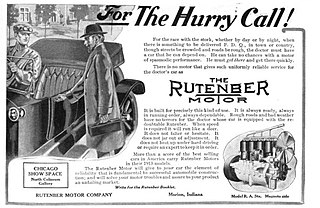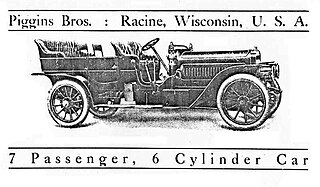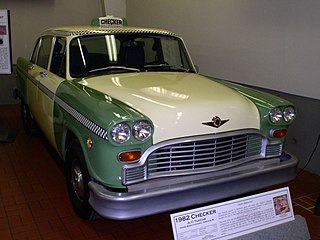
Checker Motors Corporation was a Kalamazoo, Michigan, vehicle manufacturer and tier-one subcontractor that manufactured taxicabs used by Checker Taxi. Morris Markin established the company in 1922, initially named the Checker Cab Manufacturing Company, in Chicago through a merger of Commonwealth Motors and Markin Automobile Body. The manufacturer moved to Kalamazoo in 1923 and was renamed to Checker Motors in 1958.

The Checker Marathon is an automobile produced by the Checker Motors Corporation of Kalamazoo, Michigan, between 1961 and 1982. It was marketed as a passenger car for consumers, as opposed to the similar Taxi, which was aimed at fleet buyers.

The Premier Motor Manufacturing Company built the brass era and vintage Premier luxury automobile in Indianapolis, Indiana, from 1903 to 1925.

The Lexington was an automobile manufactured in Connersville, Indiana, from 1910 to 1927. From the beginning, Lexingtons, like most other Indiana-built automobiles, were assembled cars, built with components from many different suppliers. The Thoroughbred Six and Minute Man Six were popular Lexington models.

Barley Motor Car Co. was a manufacturer of luxury automobiles in Kalamazoo, Michigan, and Streator, Illinois. It manufactured the Roamer automobile (1916–29) and briefly, the Barley (1922–24), and the Pennant (1924–25).

The Rutenber Motor Company was established as the Rutenber Manufacturing Company in Chicago, Illinois, United States, to manufacture a four-cylinder engine to the design of Edwin Rutenber.

The Piggins was a brass era American luxury automobile manufactured in 1908 and 1909 in Racine, Wisconsin by the Piggins Brothers.

Penn was the name of three American automobiles of the veteran era, but Penn Motor Car Company, located at 7510 Thomas Boulevard in Pittsburgh was the only one to enter production. The Penn brass era automobile was produced from 1911 to 1912.
Standard Motor Construction Company (1904-1905) was the successor to the U. S. Long Distance Automobile Company (1900-1903) of Jersey City, New Jersey. The American Veteran Era Long Distance automobile was developed into the Standard automobile in 1904.
The Sun automobile was made in Elkhart, Indiana from 1916 to 1917, and in Toledo, Ohio from 1921 to 1922.

The Michigan was a brass era automobile manufactured in Kalamazoo, Michigan from 1904 to 1913 by the Michigan Buggy Company and its subsidiary the Michigan Motor Car Company.

The Matheson was a luxury American automobile manufactured from 1903 to 1912, first in Grand Rapids, Michigan, then Holyoke, Massachusetts and from 1906 in a purpose-built factory in Forty Fort, Wilkes-Barre, Pennsylvania.

The Metz Company was a pioneer brass era automobile maker established by Charles Herman Metz in Waltham, Massachusetts, from 1909 to 1922.

The Partin Manufacturing Company was a brass era American automobile manufacturer, headquartered at 29 South LaSalle Street, Chicago, Illinois from 1913 to 1917. The Partin-Palmer automobile and Pioneer cyclecar were produced.

The Cole Motor Car Company was an early automobile maker based in Indianapolis, Indiana. Cole automobiles were built from 1908 until 1925. They were quality-built luxury cars. The make is a pioneer of the V-8 engine.
The Pennant was an automobile marque of the Barley Motor Car Co. in Kalamazoo, Michigan (1924–25) for taxicabs. Barley also made the Roamer (1916–29) and the Barley automobiles (1922–24). The Pennant was a continuation of the Barley configured for taxi service.

The Jackson Automobile Company was an American Brass Era automobile manufacturer located in and named for Jackson, Michigan. The company produced the Jackson from 1903 to 1923, the 1903 Jaxon steam car and the 1904 Orlo.

Checker Taxi was a dominant taxicab company and national franchisor that was based in Chicago, Illinois. Checker Motors was an American vehicle manufacturer based in Kalamazoo, Michigan that built the iconic Checker Taxicab, sold commercially as the Checker Marathon until 1982. Both companies were owned by Morris Markin by the 1930s.
The Hamilton Motors Company was founded in 1917 by Guy Hamilton, after his Grand Haven, Michigan Alter Motor Car Company went bankrupt. The company produced only one car, the Model A-14, which was a four-cylinder, 28 hp touring car with a 112-inch (2,800 mm) wheelbase. He promised to make a six-cylinder car, but never did.

Leach-Biltwell Motor Company manufactured and distributed the Leach luxury automobile from 1919 to 1924 in Los Angeles, California.

















